- Home
- Antonia Fraser
Quiet as a Nun Page 8
Quiet as a Nun Read online
Page 8
'The community came and tended to the tower. After it happened,' Sister Liz observed over her shoulder as we climbed. She meant: you won't find anything distressing here, as in the graveyard. She said aloud: 'And no-one has been here since.'
I believed her. Once again my feelings had frozen. I gazed up at Sister Elizabeth's retreating black back, her neat black feet with their goloshes over black strap shoes, black stockings, black skirts looped up at the sides for walking the muddy fields. Sister Elizabeth panted slightly. The door banged to downstairs, removing our light. But at the same moment Sister Elizabeth reached the trap door and pushed it open. She poked her head through the trap door.
There was an audible gasp and Sister Elizabeth stopped quite still on the last rung of the ladder.
Then there was silence. She did not move.
'Sister Liz—' I said after a minute, anxiously.
'It's all right, my child,' she replied, rather heavily. 'Just that I had rather a shock.'
'What is it?' I could see nothing from behind her.
'Nothing really. It must be the children. A silly practical joke.'
I was going frantic. Much more slowly, Sister Elizabeth lumbered up the last rung and vanished into the room. I clambered up after her at speed. When I entered the room, Sister Elizabeth was leaning one hand on the table and panting.
The only other piece of furniture in the room was a large wooden rocking-chair. Just as I remembered, in fact. Draped in the chair and over it was a nun's black habit. Including a veil and rosary and all the other accoutrements you would need if you were to dress yourself up as a nun. Or to dress yourself if you were a nun.
At first glance there was certainly the impression of a black nun sitting there in the chair. A faceless nun. But the impression did not outlast the first second. We were looking at a set of empty and thus lifeless black clothes. Except—
'No shoes or stockings,' 1 thought suddenly, remembering my glimpse of Sister Elizabeth's stocking and goloshes.
'The children. It must be the children. They have an innocent sense of humour. They don't realise how distressing these things can be,' Sister Elizabeth muttered. She made no move to touch the clothes, I noticed. 'I'll tell Mother Ancilla and someone will fetch the habit in the morning.'
I thought: Yes. The children. The children - with their innocent sense of humour - had prepared some kind of reception tor me tonight. A sort of religious scarecrow. And I, by my early visit, had sprung their trap.
I wrinkled my nose. In the damp air, another smell disturbed me. A smell which should not have been there. For a moment I could not quite place it, although it was one of the most familiar smells of my urban life. I gazed around and my eye fell on the empty fireplace. Not quite empty. At the back of the fireplace, carelessly thrown down, were a host of cigarette stubs. No attempt had been made to conceal them.
I wondered if the nun's habit which was to greet me tonight had after all been intended to be empty. Maybe I should have to pay a return visit to the tower. It was an unlikely ghost who smoked Gauloises. And in such quantity. My spirits rose. Forewarned was, traditionally, forearmed. The Black Nun, habit and all, could expect a somewhat cynical reception from me in the late hours of the evening.
8
Secret witnesses
Supper that night in the refectory was a subdued meal. I was getting used to the tactiturn ways of Margaret Plantaganet. But Dodo's normally busy chatter was also absent. Alcohol did not play an enormous part in my life: I never drank spirits if I could help it, and I was not one of those who needed a drink or two to go on the television. In fact I avoided the pre-programme drinking as far as possible, leaving the traditional hospitality to my nubile aide, Cherry: 'Jemima's just on her way. And now won't you have another drink?' Consequently up till now I had not really noticed the total absence of alcohol from my life in the days at the convent.
Tonight I really felt the need for a drink at dinner. A carafe of wine, I reflected, would have loosened all our tongues. I remembered reading somewhere of American nuns in a newly emancipated Order who wore make-up and smoked and drank. How Americans exaggerated! Makeup did seem quite unnecessary in the brides of Christ, or perhaps that was just my Puritan streak. As for smoking - well, I had no particular feelings either way. As a non-smoker working in a profession of professional smokers, I felt more sorry for them and their addiction than anything else. But alcohol, now ... No doubt conversation in the American refectory (if they still had a refectory, that is, not a smart French restaurant) improved as a result.
Dodo and I exchanged polite news on the subject of my contemporary of the same surname, Dora Sheehy. Dodo turned out to have been named for her: 'Both of us Theodora,' she said, with a return to her old cheerfulness. 'But who could stick a name like that? She was Dora and I'm Dodo. Aunt Dora held me at my baptism, you know, she was my godmother. And why she didn't protest against another innocent child being lumbered with a name like Theodora I shall never know.'
'And Dora is now—?' I enquired delicately. On the familiar form I expected to hear: married to a doctor, probably Irish like herself, and mother of five children. '1 haven't heard from her in years,' I added untruthfully.
I had never heard from Dora Sheehy. There had been a brief competition between us - in school terms - for the friendship of Rosabelle. When I arrived at Blessed Eleanor's, Dora Sheehy was allegedly Rosabelle's best friend. And when I left, Rosabelle was unquestionably mine. But Dora, as I remembered her, had been a dull and rather sycophantic girl, whose good quality from Rosa's point of view, had been her subservience.
I much preferred Dodo, blonde curls, giggles and all. She had confided to me that she had ambitions to get into television once she had left the convent. I was not a bit surprised. One of the odd things about Blessed Eleanor's was how few of the girls had that ambition. At visits to ordinary schools for lectures or brains trusts, to say nothing of encounters with my friends' growing children, I was quite used to the sidling approaches of pretty teenagers: 'Is there an exam or something I can take?' Dodo at least was conforming to that norm.
'But she was Sister Theodora,' said Dodo. 'We talked of her the other night.'
'Sister Theodora of the Angels,' put in Margaret. It was her first remark of the evening. 'Murdered in Africa.' I felt curiously put down.
The plates were mainly empty. It would soon be the time for the traditional scraping back of our chairs and grace. Blanche Nelligan said, with a sudden very sweet smile, which lit up her heavy face:
'Would you come and have coffee with us for a change? In St Joseph's Sitting Room. We're allowed to entertain if we provide the coffee.'
'And we shall keep the odious Fourth Formers out,' added Dodo with a grimace. 'By fair means or foul.'
I realised that the restraint at dinner had been due to a genuine uncertainty as to whether I would accept the invitation. I was touched.
'Our coffee is much much better than Sister Clare's,' contributed Imogen Smith, blushing. I knew little about her so far except that she was Blanche's best friend, and always sat next to her.
'Immo brought it back from London on Sunday. Swiped from her mother's store cupboard.'
'But we'll pay her back of course—'
'Unless we decide that property is theft' - Margaret, with a rare grin.
'Oh, please let me—' I began feebly, feeling for my hand-bag. It was not there. Like the carafe of wine, that other accompaniment of life in a London restaurant, it seemed to have no place in the refectory.
'Actually the nuns don't exactly economise on things like coffee,' remarked Blanche later, pouring me an enormous mug right up to the brim with great care. It was made of thick grey china. There was no milk, and a plastic cup of white sugar had one plastic spoon sticking up out of it.
The coffee in point of fact was a great deal less nice than that provided by Sister Clare. I also thought rather wistfully of the delicate matching china in which her coffee appeared, white traced with green in a Chines
e pattern. A beaker of hot milk, a jug of cold; coloured sugar crystals, tiny silver spoons - they were actually Apostle spoons, I was enchanted to notice. The tray was lined with a cloth embroidered, as only nuns could embroider, in an exact silk replica of the china's pattern. It was all no doubt arranged to the greater glory of God. But at the same time it was most delightful for mere mortals to behold.
'Yes, this is a pretty plush convent,' remarked Imogen. 'Basins in our rooms and carpets.'
'Those are your rooms,' I felt bound to point out. 'I doubt if the nuns have basins and carpets in their cells.'
'But we pay for them, don't we?' Blanche sounded plaintive. 'Out of our school fees.'
'Or rather our parents pay for them,' Dodo as usual put more energy into her complaints. 'And don't they let us know about it .. . The last time Mummy came here she told me my room was more luxurious than the room in the hotel Daddy took her to in France for a holiday. And that was a hotel tres confortable in Michelin. I said, if that was the case I would go to France, save the school fees, much nicer and she could come here for a holiday with Daddy.'
'We are assez confortable here, Miss Shore, you must admit,' Margaret interrupted. 'But that's not the point. The point is, how comfortable are the nuns? How comfortable should they be?'
Her voice, the intensity of her gaze, gave the remark considerable authority. The slightly frivolous conversation ceased. We all began to talk about Holy Poverty, at once and in different ways. Holy Poverty, and what that meant. Vocations, and what they meant. There was one insistent theme: surely nuns were better off nursing in Africa, refusing to abandon the sick, nursing to their last gasp (witness Sister Theodora of the Angels) than teaching a lot of upper-class brats in an over-plushy convent. The last vivid words were contributed by Dodo. I got the impression that she was repeating something once said by someone else. Before I could pursue the matter, Margaret stopped the conversation again.
'Your friend Sister Miriam didn't agree with all this luxury, Miss Shore. She wanted to leave the convent lands to the poor.'
I was quite astonished by her words.
To begin with, I was amazed that these girls knew of Rosa's crazy plan. Admittedly they seemed to have been her intimates, what Miss Jean Brodie would have called her creme de la creme. How many other people at the convent had known? It opened up a whole new field of enquiry. How many of the nuns had known? Wretched Sister Edward must have known something, hence her wild accusation of Mother Ancilla. The enigmatic Sister Agnes, she of the soulful Murillo eyes, had she known? A Campion cousin, too, according to Mother Ancilla. Although the property was inherited from the Powerstock side of the family, there could have been cousinly confidences on the subject.
But there was a second point. For all their intimacy with Sister Miriam, the girls had got hold of a slightly garbled story. Rosa, according to Mother Ancilla, was determined to give away the convent lands. As soon as possible. No question of waiting for her own death. As for the question of a will, it had been the existence of Sister Miriam's unaltered will, made at the time she entered the convent, which had ensured the receipt of the property by the community.
Was Margaret testing me in some way? My instinct was at work again. I felt myself on the brink of a piece of valuable knowledge. If I trod carefully enough, I might arrive at it.
'But she didn't. She didn't leave the convent lands to the poor,' I said.
'How do you know she didn't?' Margaret, smooth, definitely up to something.
'Here we all are. Her will, I gather, for what it's worth, carried out her father's intentions, and automatically entrusted the land to the community.'
'That was her original will,' said Margaret. She let the words sink into the air of St Joseph's Sitting Room, with just enough emphasis on the word 'original' for her meaning, also, to sink very slowly but surely into my mind. I bent to my coffee, fastening my lips reluctantly to the thick edge of the china. It was by now cold and rather disgusting. But I wanted time to think. I therefore treated the rite of drinking Blanche's coffee with all the respect that would have been due to Sister Clare's superior brew.
I looked round. The furniture of St Joseph's Sitting Room did not offer much for inspection. A battered record player was the chief sign that it was a room for girlish recreation. There was a large sofa, equally battered, pushed to the back of the room, as though no-one ever sat on it. Otherwise with its pictures - Leonardo's Virgin of the Rocks, Botticelli, Fra Angelico? - I was beginning not to distinguish them in their heavy gold frames - it might have been a nuns' sitting room. The girls' notion of the unfair luxury in which they lived suddenly seemed a little pathetic to me. Once again, I got the impression that someone outside had been at work influencing their notions concerning poverty and distribution of wealth. It could have been Rosabelle herself, of course. Then Rosa had changed. I could imagine Rosa as a secret fanatic - mysterious Rosa as I used to call her - but not as a proselytiser.
At least copies of the Daily Telegraph and one copy of the Daily Express - banned in my day - were to be seen, indicating progress. The fact that they were several days old was less encouraging. Just as letters to males on the chest had seemed encouraging, until I discovered they were mainly to brothers. The Tablet was still the most prominent magazine displayed. Did they read the liberal press? It would have been good to have found a copy of the Guardian or even the New Statesman.
'Sister Miriam told us she was going to make another will,' confided Dodo in a rush. My long silence had had the desired effect.
'And then she died. And it was too late.'
I caught Blanche looking at Imogen. There was a nervous intensity about Blanche's normally rather impassive gaze. I thought I saw Imogen give her a very slight shake of the head. I was not quite sure. Margaret said nothing. Like me, she was contemplating her coffee cup.
'I don't think you should exaggerate all this,' I said carefully. 'If Sister Miriam wanted to give the lands to the poor, there was really nothing to stop her.' As Mother Ancilla had found - or very nearly found - to her cost.
'But if she was going to, well, put an end to it all, then she might want to leave the lands straightaway to the poor. In her will. No time for handing it over' - Dodo again.
I was in a quandary. On the one hand the girls had the whole matter ridiculously upside down. Rosabelle had unquestionably intended to hand over the lands. Rosabelle had not intended to die. It was the latter tragedy which had frustrated the former plan. The will, so convenient from the point of view of Mother Ancilla, was a rogue element coming out of the past. On the other hand, there was clearly more information to be gleaned from the girls about Rosa's state of mind shortly before her death.
Margaret's remark had been calculated, I was sure of it. I was beginning to think a great deal more about Margaret Plantaganet was calculated than met the eye.
'The sick, the mad if you like, don't always act very consistently,' I went on. 'I shouldn't worry about Sister Miriam's will if I were you. She probably told another lot of girls that she was going to leave the land to a lot of cats and dogs—'
'Sister Miriam was fond neither of cats nor of dogs, Miss Shore.' If Margaret had not sounded bland, she would have sounded rude. I was reminded a little of the stone-walling technique of Sister Agnes in my interview with her. 'And she did not talk to another lot of girls. We were her girls—' Ah, the Miss Brodie touch. 'Because she knew that we shared her concern about the way wealth is shared out. For the real poor.'
All the girls started talking at once:
'The third world—'
'As much food in a day—'
'No running water—'
'The convent grounds alone would house a whole estate of workers' families, hundreds of them.' It was Dodo's voice which won out. 'Instead of which upper-class drones like ourselves play hockey on them.'
I had a ghastly feeling during this cacophony that the girls were indeed great fans of my programme. Just as Mother Ancilla had said. And not only the Powers
Estate investigation, the so-called Powers Mad programme. What on earth was the title of the programme on starvation at home and abroad? Food for Thought - And Nothing Else. I had interviewed Tom in the course of it to give the work of the W.N.G. in that area a deserved little puff. Now this conversation Tom would enjoy. No established complacency here.
The evening bell put an end to these thoughts. I suddenly realised that Sister Agnes was standing at the door of the sitting room. I had no idea how long she had been there. Unlike most of the nuns, her progress did not seem to be marked by either a rustle or a jangle. No doubt it was the graceful nature of her movements which enabled her to pass from corridor to classroom so quietly. Time for night prayers in the chapel. With the exception of Margaret who was on prefect duty and could say her prayers in private as a result. Later she would join Sister Agnes in patrolling St Aloysius' dormitory. St Aloysius, the patron of youth. Not a saint for whom I had ever had much affection when at school: I suppose even then I had had not much sympathy for youth as such. The sort of young I admired were those like Margaret and Dodo, who showed some signs of thinking for themselves.
For me, it was time to make ready for the night's expedition. Through the high windows of St Joseph's Sitting Room, curtainless, I was glad to see the moon shining full and reassuring over the chapel, as promised in my diary.
'Who's got my veil?' cried Imogen in anguish, 'I know I brought it down here.'
'Sister Agnes, do let her off her veil. It's only night prayers,' said Blanche. 'Two minutes flat in the chapel; as if God cared about a veil—'
'Mother Ancilla is most particular about your veils in the chapel. You know that.' Sister Agnes's tone was strictly neutral. It was impossible to tell whether she felt that Mother Ancilla and God were on the same side as regards veils or not.
'Come on, Immo, here's a veil for you,' said Margaret kindly. 'One of the Fourth Formers must have left it behind.' She pulled a rather dusty looking black veil from behind the sofa. It was caught. There was a sharp tug, the veil came away, then the noise of a scuffle and a loud cry.

 Warrior Queens
Warrior Queens The Gunpowder Plot
The Gunpowder Plot Cromwell
Cromwell The Weaker Vessel: Women's Lot in Seventeenth-Century England
The Weaker Vessel: Women's Lot in Seventeenth-Century England Marie Antoinette: The Journey
Marie Antoinette: The Journey Oxford Blood
Oxford Blood Your Royal Hostage
Your Royal Hostage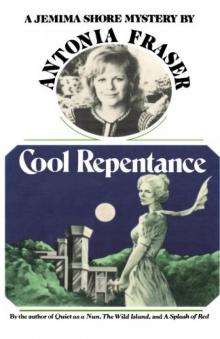 Cool Repentance
Cool Repentance Mary Queen of Scots
Mary Queen of Scots Political Death
Political Death Royal Charles: Charles II and the Restoration
Royal Charles: Charles II and the Restoration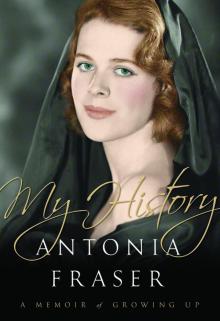 My History: A Memoir of Growing Up
My History: A Memoir of Growing Up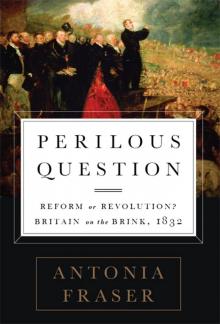 Perilous Question: Reform or Revolution? Britain on the Brink, 1832
Perilous Question: Reform or Revolution? Britain on the Brink, 1832 Jemima Shore at the Sunny Grave
Jemima Shore at the Sunny Grave A Splash of Red
A Splash of Red Must You Go?: My Life With Harold Pinter
Must You Go?: My Life With Harold Pinter Love and Louis XIV: The Women in the Life of the Sun King
Love and Louis XIV: The Women in the Life of the Sun King The Warrior Queens
The Warrior Queens The Wild Island
The Wild Island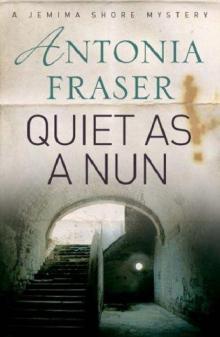 Quiet as a Nun
Quiet as a Nun Perilous Question
Perilous Question Cromwell, the Lord Protector
Cromwell, the Lord Protector Gunpowder Plots
Gunpowder Plots The Wild Island - Jemima Shore 02
The Wild Island - Jemima Shore 02 Gunpowder Plots: A Celebration of 400 Years of Bonfire Night
Gunpowder Plots: A Celebration of 400 Years of Bonfire Night Gunpowder Plots_A Celebration of 400 Years of Bonfire Night
Gunpowder Plots_A Celebration of 400 Years of Bonfire Night Marie Antoinette
Marie Antoinette Must You Go?
Must You Go?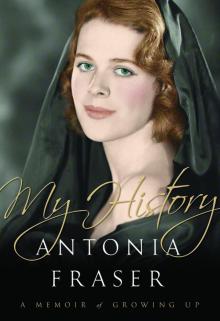 My History
My History